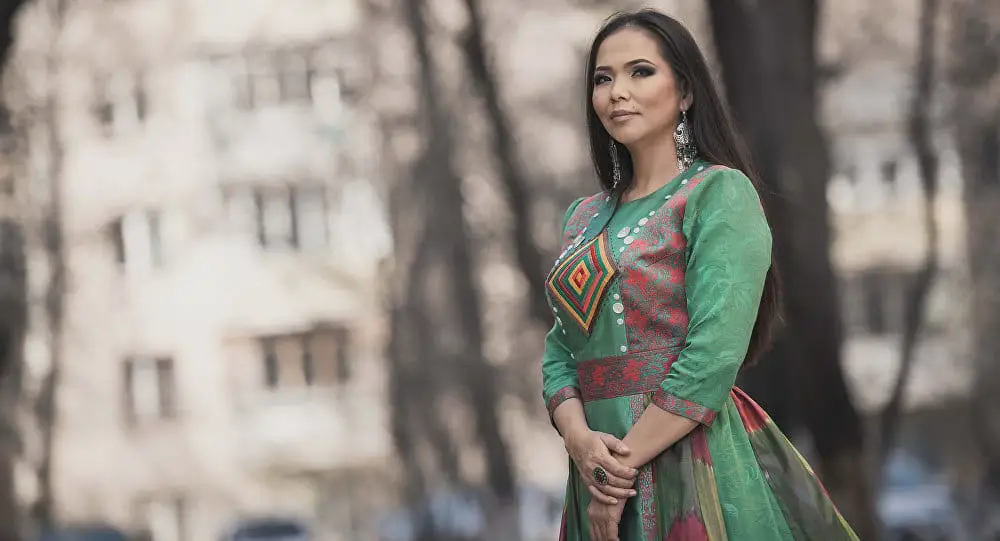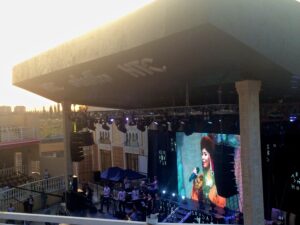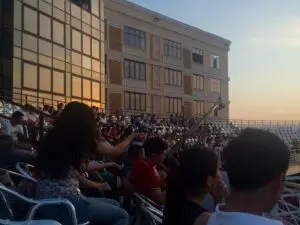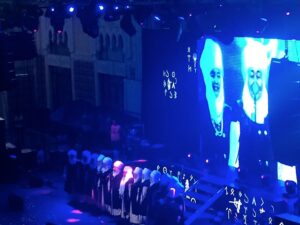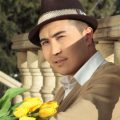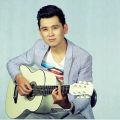Gulzada Ryskulova (Гулзада Рыскулова; her stage name is gulzada, in Roman letters and often lowercase) is a well-known contemporary Kyrgyz singer. She writes her own music and lyrics. Much of her music is “inspired by Kyrgyz traditions and pride in [her] nation,” she told Sputnik Kyrgyzstan. She further said that while her genre is usually considered “ethnic” music, that’s not all she does—she likes to experiment with genre, among them ethno jazz, rock, and pop. And besides that, her voice is absolutely magnificent.
Ryskulova was born and grew up in Chybai, a village in Uzgen province, near Osh, to a musical family—her mother is now in the band Alapar, where she sings and plays the komuz. Ryskulova had always dreamed of being a performer who could command large concert venues. She was able to attend a music institute starting in 1995, when Kyrgyz society was in flux; there, she studied the traditional accordion, or bayan, though ethnic music wasn’t really popular at the time.
She got her big start in 2010, when she won a contest for traditional music. Once she fulfilled her dream of performing in a major concert, she was determined to keep going. Her current career and outlook on music stem from her early song “I Am the Daughter of a Kyrgyz” (“Мен кыргыздын кызымын”), which provided her with the impetus to keep blending the traditional and contemporary. She began performing while dressed in traditional Kyrgyz attire, though she stresses that ethnic music is not all she does—and that ethnic music itself does more than express the history of a people. Her first solo concert in Bishkek took place in June 2014, in an art show called Awakening (Толгонуу), which expressed the national culture of Kyrgyzstan.
She has taken part in concerts, performances, and contests all over the world, and has met admirers everywhere. In 2015 she performed at the Spirit of Tengri (Дух Тенгри) Contemporary Ethnic Music Festival, which included performers of ethnic music from all over the world. She is actively touring and performing today. In addition, she takes part in charitable activities—she was an active supporter of the recent campaign called Elden Elge (Элден Элге) to help the Pamir Kyrgyz, who live high in the Pamir mountains.
Gulzada Performance at Ala-Too Amphitheater in Bishkek
Walking around Bishkek in the summertime, you get the sense that it’s a youthful city. School children run down the streets laughing while young families push strollers through parks and promenades. Don’t get me wrong, the city has its fair share of babushkas (to whom you must always give up your seat on the marshrutki), but as I walk around the streets teem with energy. And what do young people do on the weekends but go to music concerts?
Gulzada is a Kyrgyz singer who combines elements of traditional Kyrgyz culture and music with pop and jazz, and she played in Bishkek in mid-June in support of her new album, Tolgonuu. The concert was at Ala-Too (Absamat Masaliyev St), a well-known entertainment complex in Bishkek. Not only does the venue house multiple restaurants and reception halls, but there is also a 1000-seat amphitheater in back. This past Friday evening, diners, concert-goers and wedding guests all filed onto the grounds, and though Ala-Too is a little challenging to reach by bus or marshrutka, any taxi driver will know exactly what location you’re referring to. The amphitheater was large and bright, and my 500 som ($10) “fan zone” ticket bought me standing room right in front of the stage. Though I was pleased to be so close to the action, I was very relieved when we were allowed to take some empty seats in the upper balcony as the show was about to start. And it’s a good thing, too, because the concert was over two hours long!
As an orchestra of traditional Kyrgyz instruments began to play, Gulzada took the stage in a costume inspired by traditional Kyrgyz dress: a long orange dress, braided hair under a large fur hat, and heavy silver jewelry. The first half of the program was dedicated to this fusion of tradition with contemporary pop melodies. The stage was decorated with projections of ancient Kyrgyz runes, traditional instruments played modern arrangements, and both the musicians’ costumes and Gulzada’s many costume changes showcased a wide variety of traditional dress. Gulzada spoke entirely in Kyrgyz throughout the show, and from what I am told, her lyrics mostly depict stories and tales of national themes and heroes. The highlight of this half was the chorus of older women in matching costumes who joined Gulzada onstage for a few songs as the crowd enthusiastically cheered and clapped along.
The second half of the concert featured a jazz band in jeans and t-shirts, Western-style costumes, and multiple back-up singers. Many of the songs were punctuated by confetti cannons, shooting flames, and backup dancers, but I was less enthralled with this half of the program. Before, I had been captivated by Gulzada’s powerful voice and the beautiful sounds of instruments foreign to my ears. Though the singing was just as strong in the second half, the jazz band sounded dull in comparison. Perhaps my attention span was overextended one hour into the event, or maybe it was the cheesy moves of the backup dancers, but I suspect that a concert where you can’t understand any of the lyrics is made even less interesting when the other aspects of the performance no longer intrigue. The audience was still into it, however, and each song ended with a parade of concertgoers bringing flowers up to the stage and presenting them to Gulzada, who graciously accepted each bouquet with a “Rahmat.”
After the concert ended, the crowd filed down through one of the outdoor restaurants, and I stopped for a bite to eat on the way out. If you do want to visit the Ala-Too venue, I don’t recommend going just for the food, as it was mediocre and expensive. Aside from that however, it was a great evening. Gulzada put on an impressive show; she is a charismatic performer, and the fusion of traditional and contemporary genres was incredibly compelling.


